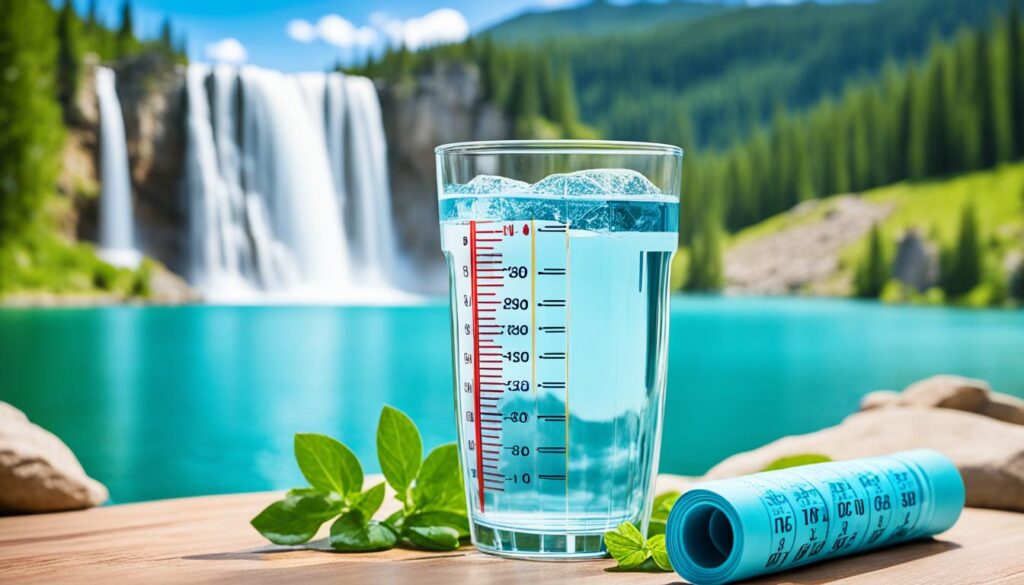Many people look for quick ways to lose weight. Some try dieting like intermittent fasting or even more extreme methods such as fat loss water fasting. This method has become popular for its quick weight loss and potential health boosts from ketosis, autophagy, and calorie restriction. But, is it safe and effective for improving how we look and how healthy we are?
Water fasting means you eat and drink nothing but water for a certain time, usually 24-72 hours. Supporters say it helps in losing a lot of weight and improves how our body processes sugar. But, it’s important to know the good and bad of water fasting before trying it. It can cause dehydration, mess with your body’s minerals, and lead to bad weight loss if not careful.
This article will look into the science behind water fasting for fat loss. We’ll see if it really works for losing weight and getting healthier. Also, we’ll talk about how to do water fasting in a safe and useful way. Plus, we’ll mention other ways that might be better for some people’s health goals.
Key Takeaways
- Water fasting stops you from eating or drinking anything except water for 24-72 hours
- It could help you lose weight by putting your body in ketosis, encouraging autophagy, and cutting calories
- It might make your body handle sugar better and improve your overall health
- But, it could cause dehydration, problems with your body’s minerals, and risky weight loss
- Doing it right and having a doctor watch over you are really important for its success
- For some, choosing other methods like intermittent fasting could be a better option
What is Water Fasting for Weight Loss?
Water fasting is a way to lose weight fast and clean your body. You only drink water for 24 to 72 hours. People do this to get health benefits like making your cells work better and improving how your body uses energy.
Understanding the Basics of Water Fasting
The idea behind water fasting is simple. It lets your body stop digesting food so it can do other jobs like fixing cells and cleaning out toxins. Because you don’t eat, your body starts using its own stored fat for energy. This can help you lose weight. It also makes your body less swollen, helps it respond better to insulin, and cleans out old or sick cells through a process called autophagy.
Reasons People Choose to Water Fast
There are many reasons why people try water fasting. Some do it to shed pounds quickly. Others want to detox or clean their bodies. It can also make you feel better overall.
- Rapid weight loss
- Detoxification and cleansing of the body
- Improved overall health and well-being
- Spiritual or religious purposes, such as during Ramadan or Yom Kippur
- Preparation for certain medical procedures, such as colonoscopies
There are also diets that are like water fasting but a bit easier. For example, the lemon detox cleanse includes lemon juice, maple syrup, and cayenne pepper. While you eat a few calories, it still aims to give the same good effects as water fasting.
It’s important to note that while water fasting may offer potential health benefits, it is not suitable for everyone and should be approached with caution. Consulting with a healthcare professional before starting any fasting regimen is highly recommended.
Benefits of Water Fasting for Fat Loss
Water fasting is becoming popular for both losing weight and being healthier. While scientists need to do more research, water fasting seems to do some good things for our bodies. It might make us *clean out our cellular closets*, help us improve how our bodies deal with blood pressure, insulin, and hunger cues, and lower the chances of getting some serious health issues.
Promotes Autophagy and Cell Regeneration
Water fasting stands out because it can kickstart autophagy. This means our body gets a chance to clear out old and faulty cells to make room for new, healthy ones. By doing this, water fasting might help us avoid diseases like cancer, Alzheimer’s, and heart issues.
Reduces Blood Pressure in Hypertensive Patients
For those with high blood pressure, water fasting could really help. In a study, doing a 10-day water fast lowered the average blood pressure by 20/7 mmHg. What’s more, these good effects lasted even after the fasting was over. So, it could be a good long-term solution for keeping blood pressure in check.

Improves Insulin and Leptin Sensitivity
Water fasting can also fine-tune how our body handles blood sugar and hunger. By boosting insulin and leptin sensitivity, our bodies can use sugar better and control how much we eat. This might lower the risk of diabetes and help keep our weight in check.
May Lower Risk of Chronic Diseases
Aside from losing weight, water fasting might also help cut the risk of big health problems such as heart disease, cancer, and diabetes. Though we need more studies with people, tests on animals look really promising. They show that water fasting may reduce issues like inflammation and stress that lead to chronic diseases.
“Water fasting has the potential to significantly improve health markers associated with chronic diseases, making it a promising tool for disease prevention and management.” – Dr. Jason Fung, Author of “The Complete Guide to Fasting”
| Benefit | Mechanism | Potential Impact |
|---|---|---|
| Promotes Autophagy | Breaks down and recycles old, damaged cells | Reduced risk of cancer, Alzheimer’s, and heart disease |
| Reduces Blood Pressure | Improves cardiovascular function and reduces inflammation | Long-term benefits for blood pressure management |
| Improves Insulin and Leptin Sensitivity | Enhances glucose utilization and appetite regulation | Lower risk of diabetes and easier weight management |
| Lowers Risk of Chronic Diseases | Reduces inflammation, oxidative stress, and other risk factors | Potential prevention and management of chronic diseases |
Risks and Considerations of Water Fasting
Water fasting might have some benefits, but it’s important to know the risks. Doing it without the right guidance can cause health problems. So, it’s vital to be careful and understand what you’re doing.
Unhealthy Weight Loss and Muscle Loss
One big risk is unhealthy weight loss. You might lose fat, but fast weight loss can also mean losing water, carbs, and even muscle. Losing muscle can slow down your metabolism and make staying at a healthy weight harder.
Dehydration and Electrolyte Imbalances
Not drinking enough water is a major risk. 20-30% of the water we get is from food. Without food, our body loses this extra source of water, which can lead to dehydration.
Besides, fasting can cause a drop in essential minerals like sodium and potassium. This might lead to issues like dizziness or fainting from low blood pressure when standing.

Potential Aggravation of Certain Medical Conditions
Water fasting might make some health conditions worse. People with certain health problems should talk to a doctor before fasting. These issues might get worse with fasting:
| Medical Condition | Potential Risks |
|---|---|
| Gout | Fasting can make uric acid levels rise, which might start a gout attack. |
| Diabetes | Taking diabetes medications while fasting can cause dangerous blood sugar changes. |
| Eating Disorders | It could make unhealthy eating habits worse or lead to eating disorders. |
Anyone with a health condition should get advice from a healthcare professional before fasting. This is to make sure it’s safe for them.
How to Safely Implement Water Fasting for Weight Loss
Starting a safe water fasting routine for weight loss needs careful steps. You should know how long and often to fast. It’s also crucial to understand how to end the fast right. This way, you gain the most benefits with few risks.
Preparing Your Body for Fasting
To start a water fast, your body needs to be ready. Begin by eating less and cutting out snacks. Move towards fasting over a few days. This prep time helps your body get used to fasting, which makes it easier.
Eat foods packed with nutrients as you get ready. These include:
- Leafy greens and colorful vegetables
- Fruits rich in antioxidants and fiber
- Lean proteins like fish, chicken, and legumes
- Healthy fats from sources like avocados, nuts, and seeds
This gradual change in diet helps you get ready for fasting. It prepares your body for the upcoming fast.
Recommended Duration and Frequency
Start with shorter fasts and listen to your body. Begin with 12-16 hour fasts and work up to 24-72 hours. Always pay attention to how you feel during the fast.
Fasting for 24-72 hours is usually safe. But, fasting longer than 72 hours needs medical guidance. How often you fast depends on your health and goals.
| Fasting Duration | Recommended Frequency |
|---|---|
| 12-16 hours | 1-2 times per week |
| 24 hours | Once every 1-2 weeks |
| 48-72 hours | Once per month or every other month |
Everyone’s body reacts to fasting differently. Notice how you feel and adjust your fasting as needed. This is important to stay healthy.
Breaking the Fast Properly
How you end a fast is as important as the fast itself. Eating solids too soon can shock your body. This can lead to trouble, including refeeding syndrome. Safely finish your fast with these steps:
- Begin with small amounts of easy-to-digest foods like fruits and veggies.
- Slowly increase the amount and add more complex foods over a few days.
- Don’t eat too much or indulge in heavy foods right away.
- Stay hydrated by drinking water and herbal teas.
Ending your fast carefully helps your body start eating solid foods again. It aids your digestion and keeps the good effects of the fast going.
Water fasting can help with weight loss and health. But it’s not for everyone. Always check with a doctor before you start, especially if you have health issues or are taking any drugs.
Alternatives to Water Fasting for Effective Weight Loss
Water fasting is popular for quick weight loss. But it’s not for everyone. Luckily, there are other ways to lose weight that are more doable long term. You can try intermittent fasting or eat a balanced, controlled diet to lose weight. These methods are safer than water fasting and still effective.
Intermittent Fasting Approaches
Intermittent fasting is a flexible way to lose weight. For example, 16/8 fasting involves eating only in an 8-hour window. Then, you fast for 16 hours. This lets you enjoy regular meals within a set time. It makes sticking to the plan easier.
- Improved insulin sensitivity
- Enhanced fat burning
- Increased cellular repair and autophagy
- Potential reduction in inflammation
Intermittent fasting can help with weight loss without being extreme.
Balanced, Calorie-Controlled Diets
A balanced diet is another option. It means eating foods that are full of good nutrients. You eat these foods in the right amounts to use more calories than you take in. This steady approach to eating helps with long-term weight loss. Aim to eat lots of fruits, veggies, lean meats, and whole grains to get the nutrients you need.
When eating a balanced diet, remember to:
- Calculate what you should eat every day, considering your age, gender, and physical activity.
- Try to eat 500 to 750 calories less than you need daily for a safe weight loss.
- Choose foods that are packed with vitamins, minerals, and fiber.
- Watch your portions and how you eat to stop from eating too much.
This diet plan helps you lose weight and stay healthy.
Remember, finding a weight loss plan that fits your life and you enjoy is important. So, whether you try intermittent fasting or a balanced diet, sticking with it and being healthy is most key.
Conclusion
Fat loss water fasting is gaining popularity for quick weight loss and health benefits. It may help with autophagy, lower blood pressure, and better insulin and leptin use. Yet, there are risks like losing too much muscle, dehydration, and possible harm to some health issues.
If you want to try water fasting safely, you must make sure your body is ready. Follow the right timing and how often you do it. Also, ending the fast slowly is important to avoid problems. As an alternative, you can consider intermittent fasting such as the 16/8 plan or watching your calories. These are safer ways to lose weight and stay healthy.
Remember, fat loss water fasting doesn’t fit everyone. Always check with a doctor before starting any fast. They can help you understand your personal risks and find a safe plan for weight loss and better health.




